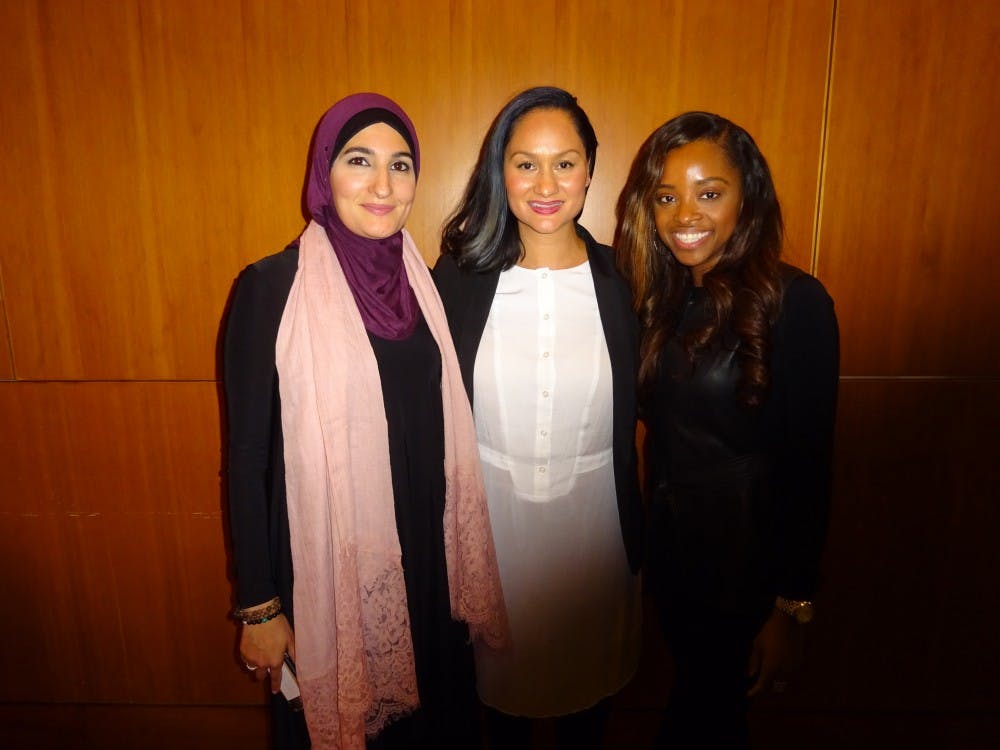On Nov. 16, three of the four co-chairs of the National Women’s March — Linda Sarsour, Tamika Mallory, and Carmen Perez — took part in a panel titled, “Silence Will Not Protect You: Womanism in the Age of Donald Trump.” The panel considered what went on behind the scenes of the largest single-day protest in U.S. history, the Women’s March.
Associate professor of African American Studies Ruha Benjamin, who moderated the conversation, began by explaining that she found the discussion to be necessary and powerful.
“Knowledge is produced by doing things in the world,” said Benjamin. “We learn and we gain knowledge by actually getting our hands dirty. This is an opportunity for us to actually learn through the practice.”
Benjamin asked each of the panelists to recount their first experiences with feminism.
Sarsour shared her background as the daughter of Palestinian immigrants growing up in a very conservative and traditional Arab-American household. Sarsour was the oldest of several daughters, a trend that disappointed her grandmother and neighbors’ traditional hopes for a son.
“It really didn’t sit well with me, even as a young child,” said Sarsour. “So I started to have that conversation with my parents. Were we not good enough? Why wouldn’t you be happy not to have a son?”
Mallory described her early engagement with feminism while growing up in an African-American family.
“Black families, Black women, don’t necessarily identify with feminism. It’s just a struggle that we’re in with the men in our households, and we’re all fighting at the same time,” explained Mallory. “But, when I think about my childhood, I grew up in a family of strong-ass women … my understanding of Black womanhood was to be strong, to be bold, and to be beautiful.”

Perez explained to the audience that when she was growing up, her home wasn’t the comforting place that she wanted it to be. She ultimately developed a home outside of her nuclear family, one that was rooted in her diverse community through her experience in basketball and hip-hop.
“What we created together was a pact that allowed us to be children, to be safe when we didn’t feel safe at home,” Perez described.
The panelists also delved into their experiences organizing the Women’s March.
“People think that collaboration means that it has to lead to unity, and that unity is uniformity. Unity is not uniformity,” said Sarsour. “So, if your expectations are to show up to a movement believing that we’re all going to believe the same things, then the movement has already failed.”

Mallory built on Sarsour’s sentiment, describing her experience welcoming new members into the movement.
“I asked often, ‘Where were you [before the march]?’ I don’t believe that people can organize without being honest about the fact that they were not there, that they have not been engaged in this, and the only reason why they showed up is because Donald Trump became president, and somehow that scared them,” Mallory said.
Perez also weighed in on the discomfort she felt as a woman of color navigating the power struggle of racial dynamics within the march.
“When we were trying to lead, there was this tension that was happening because white women were like, 'Well, what about us? Am I going to be able to do an interview? I’m also working along your side; I’m also here,'” said Perez. “What it reminds me of is that oftentimes we are comfortable oppressing others.”
Sarsour closed the discussion by pointing out that this shared discomfort was not only normal, but necessary for the sake of progress and growth.
“Being uncomfortable is okay in the movement because — guess what — it means that you’re doing something right,” Sarsour noted. “We are in a moment where it’s not about feeling good — we are in the most critical moment of your generation.”
The panel took place at 7 p.m. on Nov. 16 in the Carl A. Fields Center for Equality and Cultural Understanding.








